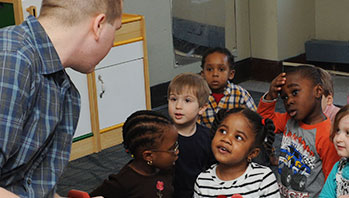- chart paper
- marker
- explore
- observe
- scientist
MA Standards:
Speaking and Listening/SL.PK.MA.6: Speak audibly and express thoughts, feelings, and ideas.
Writing/W.PK.MA.2: Use a combination of dictating and drawing to explain information about a topic.
Head Start Outcomes:
Approaches to Learning/Initiative & Curiosity: Demonstrates eagerness to learn about and discuss a range of topics, ideas, and tasks.
Language Development/Receptive Language 2: Comprehends increasingly complex and varied vocabulary.
Language Development/Expressive Language 3: Uses increasingly complex and varied vocabulary.
PreK Learning Guidelines:
Science and Technology/Inquiry Skills 1: Ask and seek out answers to questions about objects and events with the assistance of interested adults.
English Language Arts/Composition 16: Use their own words or illustrations to describe their experiences, tell imaginative stories, or communicate information about a topic of interest.
Talk Together: What Is a Scientist?

© Commonwealth of Massachusetts, Department of Early Education and Care (Jennifer Waddell photographer). All rights reserved.
Introduce the term scientist to children. Ask, What do you think a scientist is? What do you think a scientist does? Encourage children to talk about and share their ideas. Record their ideas on a "We Are All Scientists" chart. Then explain that scientists are explorers who do many things such as,
- ask questions about the world
- make observations
- collect and record observations to find answers
Discuss how children will use all of these same skills when they explore their world. Then say, We are all scientists! As we explore, we will observe different things, ask questions about the world around us, and record our observations.
Remind children that they have already used these skills at school. Have them share a time they have used these skills. Tell children they are going to have many more chances to be scientists at school.
English Language Learners: Find and point out cognates of key vocabulary terms from children’s home languages to help bridge understanding of the new vocabulary words.
Take It Further: Help children grasp meaning of the concept vocabulary by asking them to point out and share charts and drawings they have created. As they share, comment using the concept vocabulary, such as, Your drawing records, or shows the birds you saw that live in the tree. Does that help you remember what you observed?
